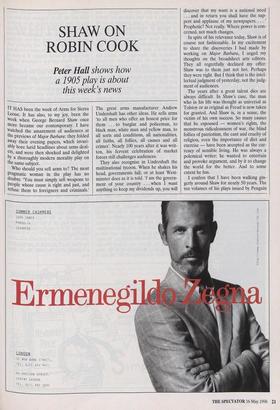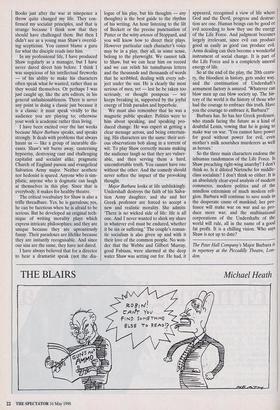SHAW ON ROBIN COOK
Peter Hall shows how
a 1905 play is about this week's news
IT HAS been the week of Arms for Sierra Leone. It has also, to my joy, been the week when George Bernard Shaw once more became our contemporary. I have watched the amazement of audiences at the previews of Major Barbara: they folded away their evening papers, which invari- ably bore lurid headlines about arms deal- ers, and were then shocked and delighted by a thoroughly modern morality play on the same subject. Who should you sell arms to? The most pragmatic woman in the play has no doubts: 'You must simply sell weapons to People whose cause is right and just, and refuse them to foreigners and criminals.' The great arms manufacturer Andrew Undershaft has other ideas. He sells arms `to all men who offer an honest price for them . . . to burglar and policeman, to black man, white man and yellow man, to all sorts and conditions, all nationalities, all faiths, all follies, all causes and all crimes'. Nearly 100 years after it was writ- ten, his fervent celebration of market forces still challenges audiences.
They also recognise in Undershaft the multinational tycoon. When he shakes his head, governments fall; or at least West- minster does as it is told. 'I am the govern- ment of your country . . . when I want anything to keep my dividends up, you will discover that my want is a national need . . . and in return you shall have the sup- port and applause of my newspapers. . . . ' Prophetic? Not really. Where power is con- cerned, not much changes.
In spite of his relevance today, Shaw is of course not fashionable. In my excitement to share the discoveries I had made by working on Major Barbara, I urged my thoughts on the broadsheet arts editors. They all regretfully declined my offer: Shaw was to them just not hot. Perhaps they were right. But I think that is the intel- lectual judgment of yesterday, not the judg- ment of audiences.
The years after a great talent dies are always difficult. In Shaw's case, the man who in his life was thought as universal as Tolstoy or as original as Freud is now taken for granted. And Shaw is, in a sense, the victim of his own success. So many causes that he espoused — women's rights, the monstrous ridiculousness of war, the blind follies of patriotism, the cant and cruelty of religion, even the importance of diet and exercise — have been accepted as the cur- rency of sensible living. He was always a polemical writer; he wanted to entertain and provoke argument, and by it to change the world for the better. And to some extent he has.
I confess that I have been walking gin- gerly around Shaw for nearly 50 years. The ten volumes of his plays issued by Penguin Books just after the war at ninepence a throw quite changed my life. They con- firmed my socialist principles, and that is strange because I think now that they should have challenged them. But then I didn't see as a young man Shaw's overrid- ing scepticism. You cannot blame a guru for what the disciple reads into him.
In my professional Iife, I have produced Shaw regularly as a manager, but I have never dared direct him before. I think I was suspicious of his intellectual fireworks — of his ability to make his characters often speak what he wanted, rather than as they would themselves. Or perhaps I was just caught up, like the arts editors, in his general unfashionableness. There is never any point in doing a classic just because it is a classic: it must speak vividly to the audience you are playing to; otherwise your work is academic rather than living.
I have been excited over the last weeks because Major Barbara speaks, and speaks strongly. It deals with problems that always haunt us — like a group of incurable dis- eases. Shaw's wit burns away, cauterising hypocrisy, destroying cant and challenging capitalist and socialist alike, pragmatic Church of England parson and evangelical Salvation Army major. Neither aesthete nor hedonist is spared. Anyone who is sim- plistic, anyone who is dogmatic can laugh at themselves in this play. Since that is everybody, it makes for healthy theatre.
The critical vocabulary for Shaw is also a trifle threadbare. Yes, he is garrulous; yes, he can be facetious when he is afraid to be serious. But he developed an original tech- nique of writing morality plays which express intricate philosophies; and they are unique because they are uproariously funny. Their paradoxes are lifelike because they are instantly recognisable. And since our sins are the same, they have not dated.
I have always believed that for a director to hear a dramatist speak (not the dia- logue of his play, but his thoughts — any thoughts) is the best guide to the rhythm of his writing. An hour listening to the lilt of Beckett or the precise punctuation of Pinter or the witty ariosos of Stoppard, and you will know how to direct their plays. However particular each character's voice may be in a play, they all, in some sense, belong to the playwright. We cannot talk to Shaw, but we can hear him on record and we can relish his tumultuous letters and the thousands and thousands of words that he scribbled, dealing with every sub- ject under the sun. He is clearly the most serious of men, yet — lest he be taken too seriously, or thought pompous — wit keeps breaking in, supported by the joyful energy of Irish paradox and hyperbole.
We must also remember that he was a magnetic public speaker. Politics were to him about speaking, and speaking pro- duced change. He was expert at getting a clear message across, and being entertain- ing. His characters are the same: their seri- ous observations bob along in a torrent of wit. To play Shaw correctly means making the audience laugh so that they are vulner- able, and then serving them a hard, uncomfortable truth. You cannot have one without the other. And the comedy should never soften the impact of the provoking thought.
Major Barbara looks at life unblinkingly. Undershaft destroys the faith of his Salva- tion Army daughter, and she and her Greek professor are forced to accept a new and realistic morality. She admits: `There is no wicked side of life: life is all one. And I never wanted to shirk my share in whatever evil must be endured, whether it be sin or suffering.' The couple's roman- tic socialism is also given up and with it their love of the common people. No won- der that the Webbs and Gilbert Murray, good Fabians, were alarmed at the deep water Shaw was setting out for. He had, it appeared, recognised a view of life where God and the Devil, progress and destruc- tion are one. Human beings can be good or evil according to how they use the energy of the Life Force. And judgment becomes largely irrelevant, since evil can produce good as easily as good can produce evil. Arms dealing can then become a wonderful instrument of social change. It is part of the Life Force and is a completely amoral energy of life.
So at the end of the play, the 20th centu- ry, the bloodiest in history, gets under way, and the continuation of Undershaft's armament factory is assured. 'Whatever can blow men up can blow society up. The his- tory of the world is the history of those who had the courage to embrace this truth. Have you the courage to embrace it, Barbara?'
Barbara has. So has her Greek professor, who stands facing the future as a kind of doubtful Lenin, vowing that he is going to make war on war. 'You cannot have power for good without power for evil, even mother's milk nourishes murderers as well as heroes.'
So the three main characters endorse the inhuman randomness of the Life Force. Is Shaw preaching right-wing anarchy? I don't think so. Is it diluted Nietzsche for middle- class socialists? I don't think so either. It is an absolutely clear-eyed analysis of modern commerce, modern politics and of the mindless extremism of much modern reli- gion. Barbara will continue to save souls in the desperate cause of mankind; her pro- fessor will make war on war and so pro- duce more war; and the multinational corporations of the Undershafts of the world will rule, all in the name of a good fat profit. It is a chilling vision. Who says Shaw is not up to date?
The Peter Hall Company's Major Barbara is in repertory at the Piccadilly Theatre, Lon- don.



























































 Previous page
Previous page